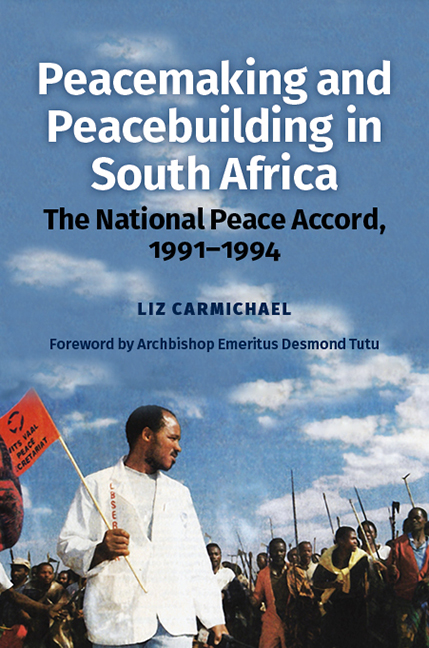Book contents
- Frontmatter
- Dedication
- Contents
- List of Illustrations
- List of Abbreviations
- Glossary
- Acknowledgements
- Note on Nomenclature
- Transition Timeline
- Foreword
- Introduction
- Part One Peacemaking, Peacebuilding, and the South African Conflict
- Part Two Peacemaking
- Part Three Peacebuilding
- Conclusion: Impact and Unfinished Business
- Bibliography
- Index
Conclusion: Impact and Unfinished Business
Published online by Cambridge University Press: 08 October 2022
- Frontmatter
- Dedication
- Contents
- List of Illustrations
- List of Abbreviations
- Glossary
- Acknowledgements
- Note on Nomenclature
- Transition Timeline
- Foreword
- Introduction
- Part One Peacemaking, Peacebuilding, and the South African Conflict
- Part Two Peacemaking
- Part Three Peacebuilding
- Conclusion: Impact and Unfinished Business
- Bibliography
- Index
Summary
The National Peace Accord was the first in the sequence of multiparty initiatives that marked South Africa's transition. In June 1991, fifteen months after Mandela's release in February 1990, the nation was mired in a complex of suspicions and violence. The ANC–IFP conflict had spread. It had not been possible to start multilateral constitutional talks and thus move towards an election. Still less was the nation ready for a Truth and Reconciliation Commission. What it was able to do, once the politicians had accepted the intervention of civil society facilitators, was to negotiate a set of agreements, the National Peace Accord, to regulate the behaviour of political parties, the government, and security forces, and to mandate civil society to join in the work of peacemaking and peacebuilding. The creation of the NPA was South Africa's first experience of constructive multiparty negotiation. Having signed the Accord, the nation had a means to tackle the violence and was free to start constitutional talks.
Unionist and astronomer Bernie Fanaroff says of this ‘crucial initiative’:
People were in terror of their lives on both sides, and the Peace Accord really began to stabilize that in a way that was actually much more effective than I’d expected. … I mean, we had a very jaundiced view of the police and the intentions of the police and the State, and I was surprised that the Peace Accord was as effective as it was and moved as fast as it did.
Strengths and weaknesses
The top party leaders bound themselves, as signatories, to ‘ensure as far as possible that all our members and supporters will comply with the provisions of this Accord and will respect its underlying rights and values’ (NPA p.4). It was a weakness that other considerations initially swayed the top ANC and IFP leadership. To maintain credibility with their supporters they did not unequivocally call for a cessation of violence but practised an ambivalent rhetoric of ‘defence’, legitimizing revenge while denying that their own supporters were responsible for any violence.
- Type
- Chapter
- Information
- Peacemaking and Peacebuilding in South AfricaThe National Peace Accord, 1991-1994, pp. 451 - 460Publisher: Boydell & BrewerPrint publication year: 2022



